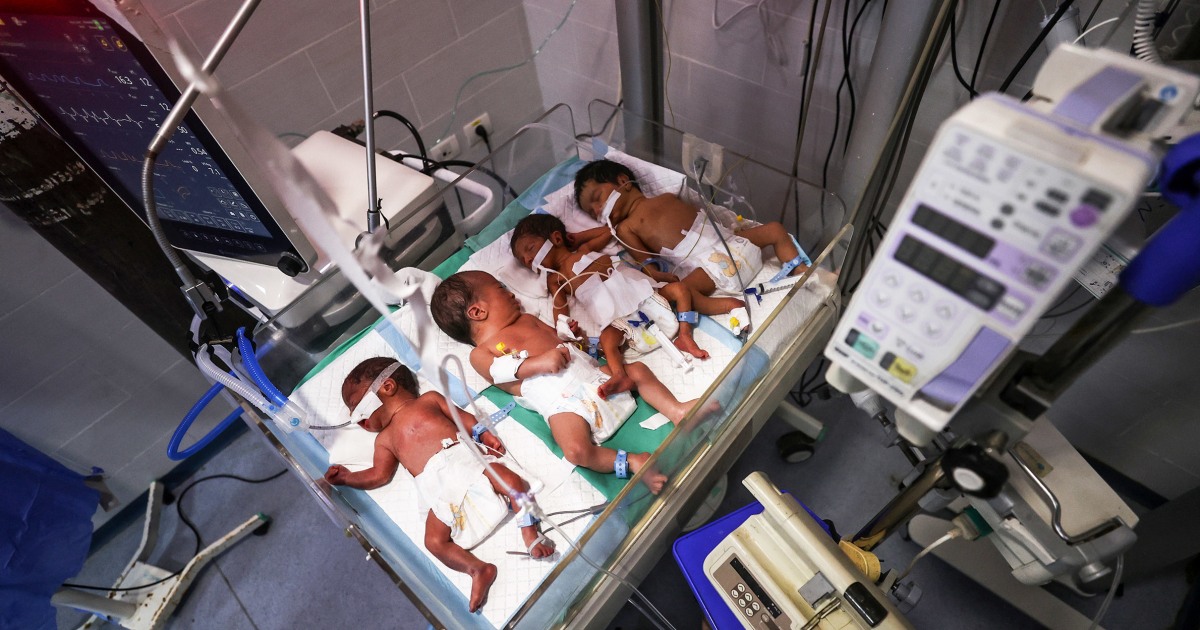As Gaza’s hospitals grapple with a critical fuel shortage, doctors warn that the lives of infants in neonatal care are at grave risk. With fuel supplies dwindling, hospitals are forced to turn off incubators and other essential medical equipment, potentially leading to dire consequences for vulnerable patients.
In a poignant visit to Nasser Hospital in Khan Younis, Dr. Ahmad Al-Farra, the head of the pediatric unit, provided a stark overview of the situation. “This baby is a full-term baby,” he explained, gesturing to an infant in an incubator. The child, reliant on mechanical ventilation, is one of many facing life-threatening conditions as the facility prepares for an imminent shutdown. Dr. Al-Farra emphasized, “If the electricity was cut off… this baby will not survive.”
The current crisis echoes earlier incidents during the ongoing conflict, where several infants died in northern Gaza due to similar circumstances. The United Nations Office for the Coordination of Humanitarian Affairs (OCHA) has warned that multiple hospitals in the enclave are nearing closure as fuel stocks deplete. The UN agency highlighted that the “total ban on fuel entry” imposed by Israel over the past 130 days has severely impacted essential services, including water, sanitation, and hygiene.
Despite a partial lifting of the blockade in May, which allowed limited food and medical supplies into Gaza, the situation remains dire. David Mencer, a spokesperson for Israeli Prime Minister Benjamin Netanyahu, responded to concerns about the fuel crisis, asserting, “The real threat to babies in Gaza isn’t a lack of fuel — it’s Hamas. They hijack fuel for terror, not hospitals.” Mencer did not comment on whether additional fuel supplies would be permitted for hospitals in the near future.
The situation at Nasser Hospital is increasingly precarious. Dr. Mohammad Saqer, the director of nursing, reported that the facility has approximately 3,000 liters (790 gallons) of diesel remaining, far short of the 4,500 liters (1,190 gallons) needed daily to maintain operations. As a result, the hospital has had to reduce electricity to non-essential departments, with Dr. Saqer warning that “the electricity will abruptly go off within 24 hours.” He added that this would endanger many patients, particularly those in intensive care.
The challenges faced by hospitals in Gaza are compounded by ongoing violence. According to the World Health Organization (WHO), none of the territory’s 36 hospitals are fully operational; 18 provide only partial services while the remaining 18 are completely non-functional. Dr. Saqer has appealed to the international community to intervene and facilitate fuel deliveries to save lives.
In a recent development, European Union foreign policy chief Kaja Kallas announced a new agreement with Israel aimed at allowing essential food and fuel into Gaza. Kallas stated that the deal could lead to “more crossings open, aid and food trucks entering Gaza, repair of vital infrastructure and protection of aid workers.” Israeli Foreign Minister Gideon Sa’ar confirmed the agreement at a conference in Vienna, highlighting potential improvements in aid access for the region.
As the situation continues to evolve, the urgent need for humanitarian support in Gaza remains a pressing concern. The lives of countless infants and other patients hang in the balance, awaiting a resolution that can bring much-needed relief to the beleaguered healthcare system.





































































